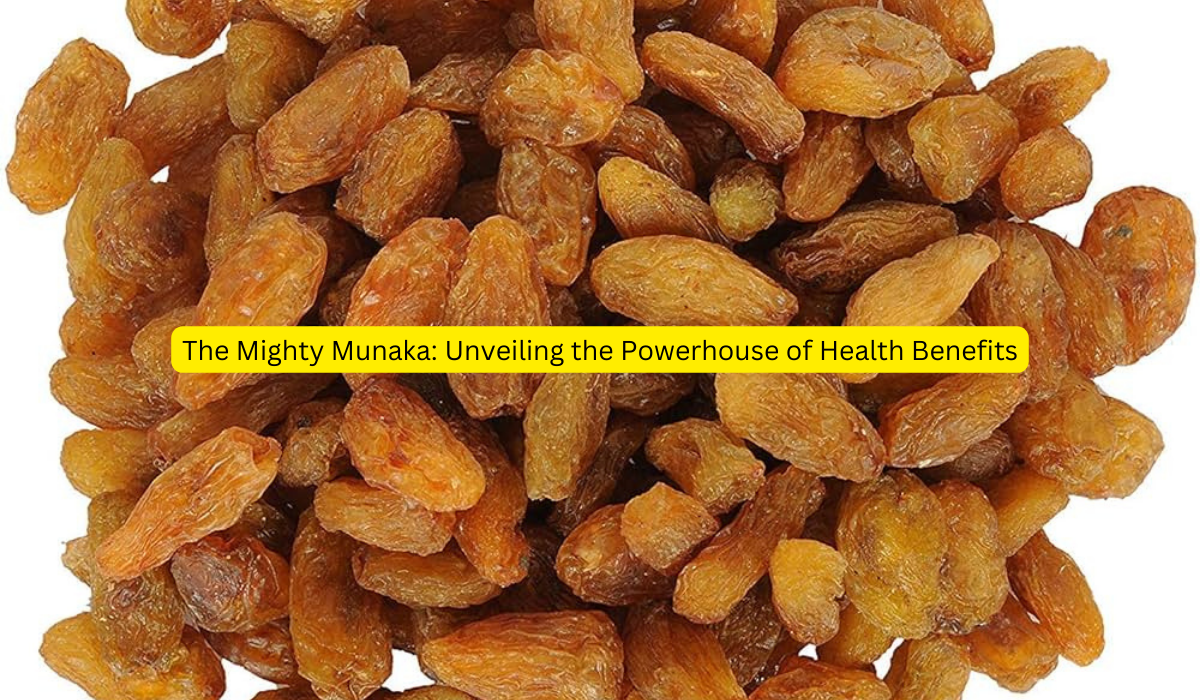Munaka, also known as raisin, might seem like an unassuming dried fruit. But don’t be fooled by its size! This tiny powerhouse packs a punch of nutrients and boasts a surprising range of potential health benefits. From boosting your energy levels to potentially aiding in digestion, munaka offers a natural way to enhance your well-being. So, ditch the sugary snacks and dive into the world of munaka, where deliciousness meets potential health benefits!
A Nutritional Powerhouse: Unveiling the Goodness Inside Munaka
Munaka isn’t just a sweet treat; it’s a concentrated source of essential nutrients. Here’s a glimpse into what makes munaka such a beneficial addition to your diet:
- Fiber: Munaka is a good source of dietary fiber, which can aid digestion, promote a healthy gut, and keep you feeling fuller for longer. Imagine fiber as tiny brooms sweeping your digestive system, keeping things moving smoothly.
- Vitamins and Minerals: Munaka boasts a range of vitamins and minerals, including iron, potassium, calcium, and B vitamins. These nutrients play crucial roles in various bodily functions, from maintaining healthy bones to supporting energy production.
- Antioxidants: Munaka is rich in antioxidants, which help combat free radicals in your body. Think of antioxidants as tiny warriors fighting off harmful molecules that can damage your cells.
- Natural Sugars: Munaka contains natural sugars like fructose and glucose. While moderation is key, these sugars can provide a quick energy boost when you need it most.
Black vs. Golden Munaka: Munaka comes in two main varieties – black and golden. Black munaka is sun-dried, which concentrates its nutrients and gives it a slightly stronger flavor. Golden munaka is typically shade-dried, resulting in a lighter color and a milder taste. Both varieties offer similar health benefits, so choose the one that suits your preference.
Beyond Sweetness: Exploring the Potential Health Benefits of Munaka
Munaka’s potential health benefits extend far beyond its delicious taste. Here are some ways munaka might positively impact your well-being:
- Aids Digestion: The fiber content in munaka can promote regular bowel movements and alleviate constipation.
- Boosts Energy Levels: The natural sugars in munaka provide a quick energy source, making it a great pre-workout snack or a pick-me-up during the day.
- May Support Heart Health: Some studies suggest that munaka’s potassium content might help regulate blood pressure, potentially benefiting heart health.
- Promotes Bone Health: The presence of calcium in munaka might contribute to stronger bones and teeth.
- Potential Immunity Booster: The antioxidants and vitamins in munaka might support a healthy immune system. Disclaimer: While munaka might offer some immune-supportive properties, it’s not a substitute for a healthy lifestyle and proper medical advice.
Remember: While munaka offers potential health benefits, it’s important to consume it in moderation. Due to its natural sugars, overindulging can lead to unwanted weight gain.
How to Enjoy Munaka: A World of Delicious Possibilities
Munaka’s versatility shines through in its various culinary applications. Here are some ways to incorporate this delightful treat into your diet:
- Snack on the Go: Enjoy a handful of munaka as a healthy and satisfying snack.
- Sweeten Up Your Yogurt: Add chopped munaka to plain yogurt for a natural sweetness and a boost of nutrients.
- Elevate Your Trail Mix: Mix in munaka with nuts, seeds, and other dried fruits for a delicious and energy-packed trail mix.
- Baking Delight: Use munaka in muffins, cookies, and bread recipes for a touch of sweetness and a chewy texture.
- Aromatic Rice Dish: Add soaked munaka to rice dishes like biryani for a unique flavor and aroma.
Beyond the Kitchen: Munaka can also be used in traditional remedies for coughs and sore throats. However, it’s important to consult with a healthcare professional before using it for medicinal purposes.
A Sweet Conclusion: Why You Should Consider Munaka
Munaka is more than just a dried grape; it’s a natural source of nutrients and a potential ally for your well-being. From aiding digestion to boosting energy levels, munaka offers a range of potential health benefits.
So, the next time you’re looking for a healthy and delicious snack, ditch the processed treats and reach for a handful of munaka. This tiny powerhouse might just surprise you with its delightful taste and potential health benefits!
Frequently Asked Questions
1. Are there any side effects to consuming munaka?
Munaka is generally safe for most people when consumed in moderation. However, due to its natural sugars, excessive consumption can lead to weight gain and blood sugar spikes. Additionally, people with diabetes or prediabetes should be mindful of their munaka intake and consult with a healthcare professional before incorporating it into their diet.
2. Can munaka help with constipation?
The fiber content in munaka can indeed help with constipation. The fiber acts as a bulking agent, promoting regular bowel movements and aiding in a healthy digestive system. However, staying hydrated is equally important for optimal digestive health.
3. Is munaka a good source of iron?
Yes, munaka is a good source of iron, a crucial mineral for transporting oxygen throughout the body. This makes it a beneficial snack for those prone to iron deficiency, especially vegetarians and vegans.
4. How many munaka should I eat per day?
There’s no one-size-fits-all answer to this question. A moderate serving of munaka is typically considered to be around 1/4 cup or a handful. However, the ideal amount can vary depending on your individual dietary needs and calorie goals.
5. Can I substitute munaka for refined sugar in baking?
Munaka can be a healthy substitute for refined sugar in baking. However, due to its higher moisture content and natural sweetness, you might need to adjust the recipe slightly. Start by using about two-thirds the amount of munaka compared to the sugar called for in the recipe. You might also need to reduce the amount of liquid in the recipe to compensate for the moisture from the munaka. It’s always recommended to experiment with a small batch first to find the perfect ratio for your desired outcome.

